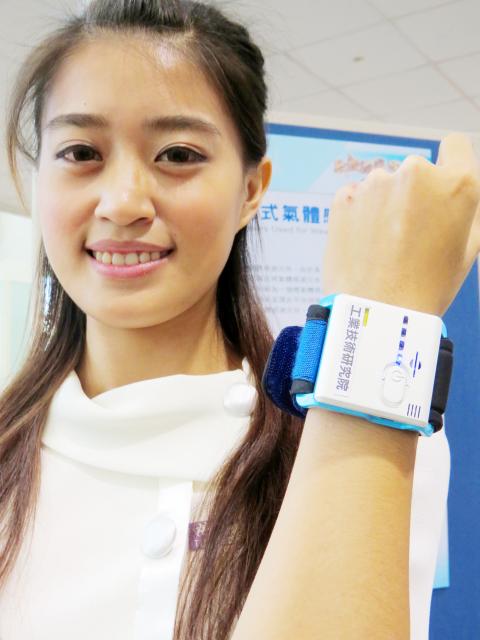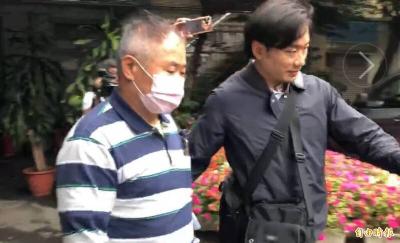New technology will enable smartphone users to self-test their breath for alcohol, the Industrial Technology Research Institute (ITRI) said on Tuesday as it announcing the development of a new alcohol-sensitive chip which can be installed in smartphones and wearable devices.
With a volume equal to only a 40th of a grain of rice, the chip — after warming up — takes only 10 seconds to determine if someone’s blood alcohol content exceeds permitted levels.
ITRI project manager Chen Jung-tai (陳榮泰) said the chip’s programming reflects domestic regulations on alcohol consumption, displaying one of three lights in response to different levels of alcohol.

Photo: Tsai Wen-chu, Taipei Times
The chip shows a green light for alcohol levels below 0.15 milligrams per liter of breath when driving is safe, a yellow light for levels between 0.15 and 0.55 milligrams when driving is not advised and a red light for levels above 0.55 milligrams, when driving is forbidden.
When implanted into a smartphone or wearable device, people would be able to use the app to view their alcohol level at any time, he said.
He added that as a platform for measuring gases, the chip could have broad applications, including measuring carbon and nitrogen monoxide, air pollution and even halitosis by estimating the amount of hydrogen sulfide in breath.
Chen said that discussions are already in progress with firms interested in licensing the chip’s technology. He estimated that industrial production of the chip would begin by the middle of next year.

Taiwan would benefit from more integrated military strategies and deployments if the US and its allies treat the East China Sea, the Taiwan Strait and the South China Sea as a “single theater of operations,” a Taiwanese military expert said yesterday. Shen Ming-shih (沈明室), a researcher at the Institute for National Defense and Security Research, said he made the assessment after two Japanese military experts warned of emerging threats from China based on a drill conducted this month by the Chinese People’s Liberation Army’s (PLA) Eastern Theater Command. Japan Institute for National Fundamentals researcher Maki Nakagawa said the drill differed from the

A fugitive in a suspected cosmetic surgery fraud case today returned to Taiwan from Canada, after being wanted for six years. Internet celebrity Su Chen-tuan (蘇陳端), known as Lady Nai Nai (貴婦奈奈), and her former boyfriend, plastic surgeon Paul Huang (黃博健), allegedly defrauded clients and friends of about NT$1 billion (US$30.66 million). Su was put on a wanted list in 2019 when she lived in Toronto, Canada, after failing to respond to subpoenas and arrest warrants from the Taipei District Prosecutors’ Office. Su arrived at Taiwan Taoyuan International Airport at 5am today on an EVA Air flight accompanied by a

A 79-year-old woman died today after being struck by a train at a level crossing in Taoyuan, police said. The woman, identified by her surname Wang (王), crossed the tracks even though the barriers were down in Jhongli District’s (中壢) Neili (內壢) area, the Taoyuan Branch of the Railway Police Bureau said. Surveillance footage showed that the railway barriers were lowered when Wang entered the crossing, but why she ventured onto the track remains under investigation, the police said. Police said they received a report of an incident at 6:41am involving local train No. 2133 that was heading from Keelung to Chiayi City. Investigators

The Keelung District Prosecutors’ Office today requested that a court detain three individuals, including Keelung Department of Civil Affairs Director Chang Yuan-hsiang (張淵翔), in connection with an investigation into forged signatures used in recall campaigns. Chang is suspected of accessing a household registration system to assist with recall campaigns targeting Democratic Progressive Party (DPP) city councilors Cheng Wen-ting (鄭文婷) and Jiho Chang (張之豪), prosecutors said. Prosecutors yesterday directed investigators to search six locations, including the Chinese Nationalist Party’s (KMT) Keelung office and the residences of several recall campaign leaders. The recall campaign leaders, including Chi Wen-chuan (紀文荃), Yu Cheng-i (游正義) and Hsu Shao-yeh